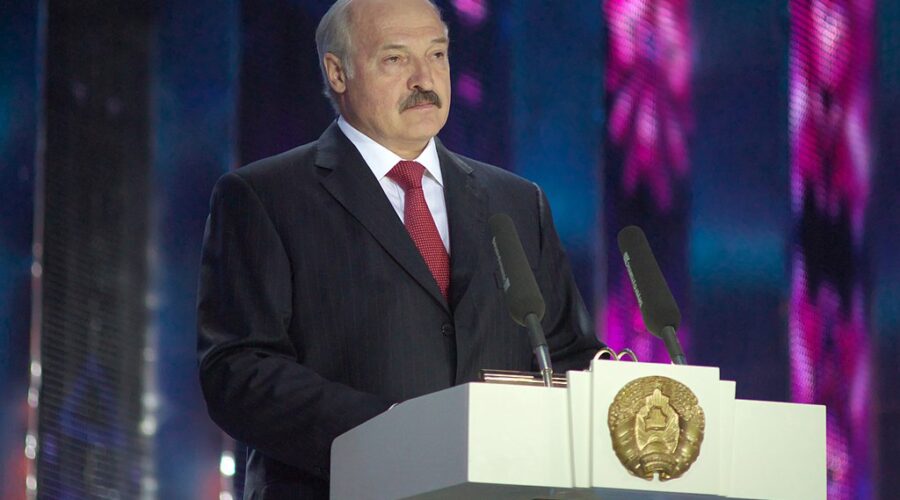Belarus seems to be preparing to more actively participate in Russia’s invasion of Ukraine. Moscow’s only ally in Europe may not deploy its troops to the war-torn country yet, but the Russian military could soon intensify attacks on Ukraine from Belarusian territory.
Reports suggest that Russian troops have started arriving to Belarus. According to the Belarusian Defense Ministry, almost 9,000 Russian soldiers will be stationed in the former Soviet republic as part of a “regional grouping of forces”. In the coming days the two countries’ militaries will conduct live-fire exercises, and their alleged ultimate goal is to protect Belarusian borders. Such moves, however, raise fears in Kyiv, as well as in the West, that Russia and Belarus could soon open a second front against Ukraine.
Indeed, Belarus has long been preparing for a potential war. Minsk has already created a people’s militia, launched mobilization drills, and some employees of the Ministry of Emergency Situations have been allocated weapons to “protect the motherland”. Their task is to “maintain order in the event of mass riots or armed conflict”. More importantly, the country’s Defense Ministry said on October 17 that Belarus “reserves the right to take preventive measures of strategic deterrence to prevent an attack”.
Does that mean that Russia’s ally is getting ready to “preventively” attack Ukraine?
The Belarusian army does not have the capacity to fight a full-scale war against Ukraine. With 9,000 Russian troops, and 170 tanks that Moscow plans to deploy to the Eastern European country, the Russo-Belarusian joint regional force does not represent a serious threat for Kyiv. It cannot capture the Ukrainian capital. What the two allies can do, though, is to force Ukraine to deploy significant number of troops to the north, which would put its eastern and southern fronts vulnerable. In addition, Russia could use Belarusian territory to launch mass missile, drone and air strikes on Kyiv. It is, therefore, not surprising that Russian MiG-31 fighters – that can carry Kinzhal hypersonic missiles and R-37M ultra-long-range missiles – have reportedly arrived in Belarus.
What the two allies can do is to force Ukraine to deploy significant number of troops to the north, which would put its eastern and southern fronts vulnerable
At this stage of the conflict, the Kremlin is expected to use Belarus merely as a tool against Ukraine. That, however, does not mean that Russian and Belarusian forces will attempt to seize Kyiv, since such a move – under the current circumstances in which Russia still desperately lacks manpower – would represent a suicide mission.
President Alexander Lukashenko is quite aware that the majority of Belarusian citizens do not support their country’s potential direct involvement in the Russian invasion of Ukraine. Moreover, there is no guarantee that Belarusian troops will not surrender if they eventually receive orders to invade its southern neighbor. That is why Lukashenko is unlikely to push Belarus into a military adventure that could have severe consequences for his own power. Furthermore, it is not very probable that the Kremlin will insist on such an action, at least in the near future. Instead, Moscow could very well use the increased Russian military presence in Belarus as a method of pressure on Kyiv, aiming to force the Ukrainian authorities to sign a ceasefire deal under the Russian conditions. However, given Russian poor performances on the ground in Ukraine, such a strategy is doomed to fail.
Belarusian leadership, on the other hand, seems to be preparing the Eastern European nation’s population for a potential incident that may force Minsk to retaliate. As TV channel “Belarus-1” reported, a series of terrorist attacks was prevented in Belarus on October 16. Several people were detained, according to Belarussian Deputy Interior Minister Gennady Kazakevich who also stressed that “members of illegal military formations were trained in Poland and gained combat experience on the territory of Ukraine.” They were allegedly part of a project whose goal was a forcible overthrow of Belarusian government.
If true, it remains unclear why Minsk does not abolish visa free regime for Polish passport-holders it unilaterally imposed in July. Poland, for its part, has called on its citizens to leave Belarus, which suggests that Warsaw takes Belarusian preparations for war seriously. Other countries, namely those that Russia sees as “friendly” – Egypt and China – have advised their nationals to leave Ukraine. Could it be that they know something that the rest of the world does not?
“Our evacuation this time is more of an early warning, making the greatest efforts to avoid damage on our citizens’ property and lives,” said Cui Heng, an assistant research fellow from the Center for Russian Studies of East China Normal University.
If China’s move is an early warning, then it is almost certain that, in the-short term, Russia and Belarus will not raise the stakes and take actions that could lead to further escalation of the Ukraine conflict. But in the foreseeable future, Belarus’ direct involvement in the Russian so-called special military operation should not be ruled out.
Image: Serge Serebro, Vitebsk Popular News

